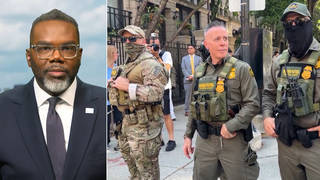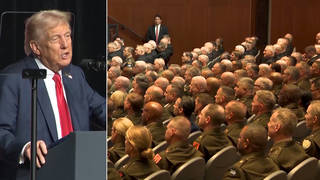
Guests
- Dave Zirinsports columnist for The Nation magazine and host of Edge of Sports Radio on SiriusXM. His latest article is “The Revictimizing of Janay Rice.”
We turn to the sporting news that has put a new spotlight on domestic violence and its lax treatment by the country’s most popular sport. Baltimore Ravens star running back Ray Rice has been cut by his team and indefinitely suspended by the National Football League after a new video showed him punching his then-fiancée into unconsciousness. But the details of the case have been known for months after a previous video from a different angle showed Rice dragging the unconscious woman out of an elevator and dropping her face-first on the ground. The Baltimore Ravens had defended Rice, while the NFL’s first response in July was to suspend him for just two games. A massive public outcry led NFL Commissioner Roger Goodell to apologize and change the league’s domestic violence policy. Why did it take the NFL so long to act? What did the league and the Ravens know, and when did they know it? We are joined by Dave Zirin, sports columnist for The Nation magazine and host of Edge of Sports Radio on SiriusXM. “This is about a National Football League that treats violence against women as a public relations crisis, not as a crisis about the ways in which the violence of the game spills over into people’s families,” Zirin says.
Transcript
AARON MATÉ: We turn now to the sporting news that has put a new spotlight on domestic violence and its lax treatment by the country’s most popular sport. The National Football League has indefinitely suspended star running back Ray Rice over a video showing him punching his then-fiancée, Janay Palmer, leaving her unconscious. The video, from February, was released Monday by the tabloid website TMZ. And a warning as we show it to our television audience, it is graphic.
On the tape, Rice and Janay Palmer are seen arguing in the elevator of a casino. As Palmer lunges toward Rice, he strikes her in the face, and she falls back and slams her head against the elevator wall. Rice then drags her from the elevator as she lays motionless.
In addition to his league suspension, Rice has also been cut by his football team, the Baltimore Ravens. That’s a reversal from just weeks ago, when head coach [John] Harbaugh stood by Rice and praised his handling of the fallout. On Monday, Harbaugh said the new video changed the team’s perception of the incident.
JOHN HARBAUGH: You know, it’s something we saw for the first time today, you know, all of us. And it changed things, of course. You know, it made things a little bit different.
AMY GOODMAN: But Harbaugh’s explanation may not satisfy critics, who say the Ravens and the league mishandled Rice’s assault from the start. The details in this case have been known for months. Video from a different camera angle had previously been released of Rice dragging Palmer out of the elevator and dropping her face-first onto the ground, unconscious. The tape released Monday was previously known to exist, but the NFL’s first response in July was to suspend Rice for just two games. That sparked a massive public outcry that led NFL Commissioner Roger Goodell to apologize and change the league’s domestic violence policy. The Ravens now say they’ve suspended Rice because he was dishonest with them about the incident.
And despite reports to the contrary, the NFL now claims it never saw the new video, saying law enforcement did not make it available. That in turn raises questions for New Jersey prosecutors. Although Janay Palmer, now Rice—she married Ray Rice—refused to testify against her husband, prosecutors apparently had this video in their possession. But Rice was able to avoid his aggravated assault charge by entering into a pretrial diversionary program.
For more, we go to Dave Zirin, author of a number of books, sports columnist for The Nation magazine, host of Edge of Sports Radio on SiriusXM. His latest article is for The Nation is “The Revictimizing of Janay Rice.”
Dave, just start from the beginning and talk about your response to what has happened.
DAVE ZIRIN: Absolutely. Howard Zinn once said that the first thing we should know about governments is that governments lie. The first thing people should know about the NFL is that the NFL lies. This is a league built on hypocrisy and brain damage, and they want us to believe that they are surprised, absolutely shocked, that some of that violence spilled over into the personal lives of their players. The NFL treats domestic violence as if it is a public relations issue, and their message in this entire story seems to be: If you are going to commit domestic violence, do not get caught on videotape. It is a profoundly cynical message.
And I don’t—I understand why everybody is showing the videotape. I understand that, because the news value of the videotape shows that, first of all, the New Jersey prosecutors who, by the way, arrested Ray Rice and Janay Palmer when this incident took place, saying both were at fault, the NFL and the Baltimore Ravens, which advanced the narrative that both were at fault, the video gives lie to that, and that is important for people to see. Although, that being said, I think one of the reasons why the videotape is so powerful is that we are conditioned in this society, because of the incredible sexism in this society, to think that in cases of domestic violence, the woman must have done something. And the videotape shows that to be a lie.
I still don’t understand why so-called progressive sites like The Huffington Post are showing the video while also talking about women’s beach bodies on the side. I don’t understand why Chris Matthews on Hardball showed the video on a loop while they were talking about it. And that’s why I wrote the article about how this video also revictimizes Janay Rice, because domestic violence counselors talk about how every time it is shown without her consent, it actually serves the purpose of hurting her. But the one thing that it does do is that it exposes profoundly the hypocrisy of the National Football League in terms of how it deals with domestic violence.
AARON MATÉ: Dave, what do you make of the NFL’s claim that they didn’t see the video until it was released by TMZ?
DAVE ZIRIN: People should understand that the National Football League has an entire security operation that’s populated by people who used to work for the Secret Service of the United States. So, that’s considered the plum job when you’re done with the Secret Service. So then you have to ask yourself a question. Either the former Secret Service officers who work for the National Football League decided that they were not going to pursue this videotape, so the NFL has plausible—had plausible deniability and they could sweep this case under the rug like they always do with issues of domestic violence, or the NFL saw it and they’re lying. And I would actually bend towards the latter. I find that it’s strains credulity to think that the NFL did not see the videotape.
But either way, the NFL has handled this horribly from the very beginning. The first time Roger Goodell met with Janay Rice, he met with her right next to Ray Rice. They came together to his office to plead for his job and to speak about what happened. Think about that for a second. That goes against every possible practice that people who deal with domestic violence talk about. The idea that the perpetrator and the person who is victimized sit side by side and beg for their economic life in front of a boss figure or an authority figure, I mean, it’s absolutely repellent. And it says something about how the NFL—how they think about women and how they think about the issue of domestic violence.
AMY GOODMAN: The Baltimore Ravens tweeted in May, quote, “Janay Rice says she deeply regrets the role that she played the night of the incident.” That tweet has since been deleted?
DAVE ZIRIN: Yes, that tweet was deleted, Amy, yesterday. That’s when it was deleted. They kept that up on their website for this entire period. The Ravens also staged a press conference where Janay Rice and Ray Rice sat next to each other, so Janay Rice could take, quote-unquote, “her responsibility” for what took place. I mean, so much of this was stage-managed by the Baltimore Ravens to make Ray Rice look as good as possible and to make the team look as supportive of him as possible. Once again, though, this is not the Baltimore Ravens in a vacuum. This is how the NFL, league-wide, deals with domestic violence. A player for the San Francisco 49ers named Ray McDonald was arrested after his pregnant fiancée was found with bruises on her body after a party and she called the police. Ray McDonald still played this past weekend despite those charges against him. Why did he play? Because he was not caught on videotape. If he was, he probably would not have been playing. So, once again, this is about a National Football League that treats violence against women as a public relations crisis, not as a crisis about the ways in which the violence of the game spills over into people’s families.
AARON MATÉ: Dave, this is NFL insider Adam Schefter speaking to ESPN Monday night, reacting to the video showing Ray Rice knock his wife unconscious.
ADAM SCHEFTER: This is arguably the biggest black eye the league has ever had. We heard Pete Rozelle talk in the days after and the years after JFK was assassinated that his biggest regret was playing games the Sunday after the president of the United States was assassinated. Roger Goodell will look back on his time as the commissioner in the NFL and say this is easily the biggest regret.
AARON MATÉ: That’s Adam Schefter speaking Monday, Adam Scefter of ESPN. I have to point out that after Ray Rice was suspended for two games initially, Schefter said on the air, “It’s a suspension that will [generate] a lot of discussion. Was the commissioner lenient enough?” Dave Zirin?
DAVE ZIRIN: Look, I think that is a shameful phrase by Adam Schefter. I don’t know if Democracy Now! listeners may realize that Adam Schefter is considered the ultimate NFL insider, incredibly high-profile. He’s clearly very upset that he was lied to about the NFL throughout this whole process about what they knew and when they knew it. And he’s responding, sounding more like Keith Olbermann than Adam Schefter.
But that being said, to call this, quote-unquote, “the biggest black eye” in NFL history, unfortunate phrasing aside for a domestic violence incident, it’s really shameful for him to say that, because the NFL has a history of horrific moments of violence against women, cases of serial rape, cases of murder. I mean, just two years ago, a player for the Kansas City Chiefs killed the mother of his child, Kasandra Perkins, and then took his own life in front of his coach in the parking lot of the stadium. Yet that’s not the biggest black eye in NFL history? So what makes this, in Adam Schefter’s eye, so much worse? It’s because it was caught on videotape, and it is a public relations crisis for the National Football League.
As long as we look at this through the lens of public relations, we’re never going to get to the bottom of this issue, which is, how do you deal with the fact that you have an incredibly violent game that causes head injuries, that causes all kinds of financial pressure on families that tend to come from poverty, and then how do you deal with it when that violence spills over into the personal lives and families of players? The NFL, for decades, has treated it as something that you push under the rug, yet in an era where everybody has phones, everything is digital, video cameras everywhere, that is much, much more difficult to do.
AMY GOODMAN: Dave, San Francisco 49ers defensive tackle Ray McDonald was arrested August 31st on felony domestic violence charges in San Jose. Despite the arrest, he started in the 49ers opening game on Sunday. The team is coached by Jim Harbaugh, the brother of Ravens coach John Harbaugh. Can you talk about this—the two brothers, the Ravens, the 49ers, the two Rays, Ray McDonald and Ray Rice?
DAVE ZIRIN: Yeah. I mean, a lot of symmetry at work there. Jim Harbaugh, interestingly enough, is somebody who for a long time has had—I’ve talked to people who are involved in that organization—who has said to players that violence against women is the one thing that he will never tolerate on this team. He has said that to players in closed-door meetings. It’s something that he apparently believes very strongly. Although if people know Jim Harbaugh, you’ll know that he phrases those kinds of declarations with the same kind of masculinist, patriarchal verve that unfortunately so too often colors how people respond to domestic violence, as if you have to have, you know, a much more manly approach to it and that’s the only way you’re going to actually squelch it. And that’s how Jim Harbaugh has approached it. Yet, unfortunately, even though Jim Harbaugh has had that rhetoric for so long, there was Ray McDonald on the field of play in San Francisco.
And once again, I said this earlier, Amy, but it really does expose how videotape has played a role in this, and because people don’t believe victims in this country. I mean, it’s the same thing that we’re talking about with Ferguson. I mean, the assumption among the majority of the United States that somehow Michael Brown must have been at fault, even though he’s the one who ended up dead, is so similar to the rhetoric around Janay Rice, to the rhetoric around Ray McDonald in San Francisco. Somehow, the woman must have been at fault, because people don’t want to believe, whether it’s the police or their NFL heroes, that maybe, just maybe, in these very violent jobs, that violence leads to acts of power and injustice.
AMY GOODMAN: Dave, I have to say, we, too, ran that video, this new video that shows what happened inside, as you were talking. And you have said you think it’s wrong to run this video. I know there is a controversy around this, and I’d like to get listeners’, viewers’, readers’ responses. You could email us, go to tweet, Facebook, whatever you’d like, to know—to let us know what you think. But that video has certainly changed everything here. Yet I do wonder—
DAVE ZIRIN: Yes.
AMY GOODMAN: —what did people think actually happened in that elevator? The first video that we all played was that video of Rice dragging his unconscious then-fiancée, now-wife, out of the elevator. He admitted he assaulted her in the elevator, and that’s exactly what the video shows.
DAVE ZIRIN: I mean, what it exposes, first of all, is the degree of complicity among the prosecutor’s office, who originally charged both Ray Rice and Janay Rice; the National Football League, which when Roger Goodell, the commissioner, said both Rices take responsibility for what took place; and the Baltimore Ravens, who staged that press conference where Janay Rice, quote-unquote, “took responsibility” for what happened—is that they all advanced this narrative that said, “Well, we don’t know what happened in that elevator.” But this idea that somehow she provoked Ray Rice punching her, the video shows that to be a lie. What’s so tragic about the United States, what’s so tragic about how we view violence against women, is that we assume that that is what happened. The assumption is not with the person who was knocked unconscious; the assumption is that she must have done something to deserve it. And that’s the thing that really makes me shake my head. And that’s—I think we have to get beyond this idea that the oppressed are somehow only vindicated if we see it with our own eyes. They never get the benefit of the doubt.
AARON MATÉ: Dave, if TMZ had this video, then obviously the prosecution likely had it, too. So does this raise questions about how prosecutors handled this case? They had a video of their suspect punching the victim.
DAVE ZIRIN: There’s no question about it. And just so people understand, that videotape, the importance of it from a prosecutorial standpoint is that they did not need Janay Rice’s consent to go forward with the prosecution, because Janay Rice, she did not want to cooperate with the prosecution. She made that choice. And in some states, if the person who is assaulted does not cooperate, it’s pretty standard for the prosecutor to then drop the case. But if you have videotape, all of that goes out the window, obviously, because you have objective proof of what took case. Yet the prosecutors still decided not to go forward. Every legal expert who I’ve both heard and spoken to over the last 24 hours say that this is profoundly unusual and that it certainly does look like that Ray Rice’s fame, his money, his connections to the National Football League are all things that—there’s no other explanation—played a role in the fact that they went for a pretrial diversion program and not for actually prosecuting him for the assault itself.
AMY GOODMAN: Wasn’t Ray Rice also applauded when he came back after his two suspensions?
DAVE ZIRIN: Yes, he was. He was applauded by the Baltimore faithful when he came out onto the field. I mean, that reflects a couple of things. It reflects our attitude nationally about domestic violence, but it also reflects the narrative that the National Football League and the Baltimore Ravens put forward through these last several months. And that’s the thing that they’re going to have to live down. You know, Amy, the slogan for the National Football League for all of these crises has always been “hate the player, don’t hate the game.” In other words, all of the criticism should go on the miscreant player, and the game itself must—is protected at all costs. This is the first time in my reporting lifetime, Amy, that it feels like the scandal of the individual player is having a massive blowback effect on the league itself, and that makes this very newsworthy and very different.
AARON MATÉ: Dave, the new policy on domestic violence, that was announced after the Ray Rice suspension generated so much outrage when he was just given two games, a two-game suspension, was that now the players will get six-games suspension. How does this compare to how the league handles drug offenses?
DAVE ZIRIN: Well, it’s interesting, because the drug offenses is carefully planned out in the collective bargaining agreement with the NFL Players Association. First offense, you get X amount of games; second offense, you get X amount of games. There are all sorts of programs that you can go into. There’s different penalties for different drugs. So it’s very clearly spelled out. Domestic violence has been a blank slate in the NFL for decades. And in a lot of ways, frankly, until Roger Goodell said, “First offense, six games; second offense, lifetime ban,” it was still a blank slate. I mean, this idea that somehow Roger Goodell was only bound to give Ray Rice two games is an absolute joke, because there were no guidelines around domestic violence, so the two games only spoke to how seriously the NFL takes domestic violence.
That being said, I have a great deal of problems, having spoken to advocates who work with violence against women, who work in domestic violence shelters, about the whole six-game and then lifetime suspension, the sort of big hammer approach that the NFL is clearly going to adopt now, going forward, because one of the things that does creates, according to people who work on this for a living, is that it creates a disincentive for women to come forward and speak about situations of abuse, especially if the entire economic security of their family is at stake in a career and in a league where the average career lifespan is only three-and-a-half years. And so, any time the NFL creates something to deal with domestic violence that disincentivizes women coming forward, that’s something that needs to be looked at very carefully.
AMY GOODMAN: Dave, in July, Pro Bowl defensive end Greg Hardy of the Carolina Panthers was convicted by a district judge in North Carolina of assaulting his ex-girlfriend. Hardy exercised his right to a jury trial, likely to take place after the season. He also played on Sunday. According to ESPN, Hardy faces a six-game suspension by the NFL if his guilty verdict for domestic violence is not overturned on appeal.
DAVE ZIRIN: Yeah, and he was not caught on videotape, so he plays, just like Ray McDonald. There are players in the NFL Hall of Fame who have been convicted and arrested on domestic violence issues. One wonders if they would be there if they had been caught on videotape. The video aspect of it is so troubling in this case, because I still stand by what I wrote in The Nation, that the showing and reshowing of the videotape revictimizes Janay Rice because it is being shown without her consent. If it was a sexual assault, we would not be showing it. There’s a reason why we have rape shield laws in this country. But that being said, the videotape is also the only thing that’s making people believe Janay Rice. I mean, this is why people want police officers to have video cameras now on their lapels, because this idea that nobody really trusts the processes that happen unless they can see them with their own eyes. And the NFL clearly has a problem, going back decades, when it deals with domestic violence. And this is certainly a wake-up call, if for no other reason than that when people are seeing how the NFL actually deals with things, how the sausages are in fact made to get us our three hours of commodified violence every Sunday, I mean, people are recoiling.
AMY GOODMAN: Should Goodell resign?
DAVE ZIRIN: Yes, absolutely, Roger Goodell should resign, not only for this, but he should resign because of the way he has handled concussions and head injuries on the job. He should resign for the way he has handled the Washington slur name here in the nation’s capital, defending its use. And he should resign for all the myriad ways that he has put the interests of the league ahead of the interests of players, fans and the general culture.
AMY GOODMAN: Very quickly, college football, you know, not just the NFL, people like Derrick Washington of University of Missouri, Jameis Winston of Florida State, can you talk about them?
DAVE ZIRIN: Yeah, absolutely. I mean, people should read the work of Jessica Luther, who writes extensively about college football and domestic violence and sexual assault. I mean, the connective tissue is so particularly egregious on the collegiate level because, of course, the players are, quote-unquote, “student athletes” and not workers. So what’s created instead is this gutter economy where women are basically held up as the perks of playing, the perks of supplying your college with millions of dollars in revenue, and all you get for it is an education that you don’t have time to attend or classes that you may not even be educationally prepared to attend. And so, this is the problem in the NCAA, and this is why this problem keeps replicating itself in the NCAA, that very dangerous connective tissue between football, particularly amateur football, and sexual violence.
AMY GOODMAN: Well, we want to thank you very much, Dave Zirin, for being with us. Dave is sports columnist for The Nation magazine, host of Edge of Sports Radio on SiriusXM. His latest piece, “The Revictimizing of Janay Rice,” we’ll link to it online. Dave is also author of many books, among them, his latest, Brazil’s Dance with the Devil: The World Cup, the Olympics, and the Fight for Democracy. This is Democracy Now! Back in a minute.












Media Options